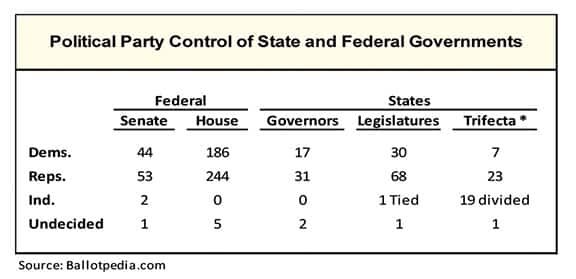According to the polls, the midterm elections were supposed to be real nail-biters, as Republicans tried to wrest control of the U.S. Senate from Harry Reid and the Democrats.
Instead, Republicans swept to victory in state after state, winning by wide margins in races that were supposed to be toss-ups, and nearly winning races in which Democrats were presumed to have big leads.

And it wasn’t just the senate races; Republicans captured 24 of the 34 governorships that were up for grabs. They now control two-thirds of the state legislatures (see table).
Why were the polls so wrong? One answer is that polls don’t have a good metric for measuring the intensity of voter preferences. For example, had they asked a Landrieu supporter how far he would walk to cast his vote, the answer might have been two or three blocks if the sun was shining. But had they asked someone fed up with the policies of the Obama administration, the answer might have been that he would crawl 20 miles on his hands and knees through briars and brambles to get to the polls.
One thing that’s clear is the vaunted Democrat get-out-the-vote machine with its computer models and micro data didn’t work the way it did two years ago when President Obama won virtually all the key swing states.
In Louisiana, Mary Landrieu captured 98 percent of the black vote. But turnout in the African-American community was far less than two years ago, when Obama headed the ticket. And “millennials” (18 to 30-year-old voters), who favor Democrats over Republicans by a two-to-one margin in the polls, apparently were preoccupied on election day. Perhaps they were looking for jobs.
The big question is: will this pattern hold for the runoff election on Dec. 6? Bill Cassidy has a comfortable lead over Mary Landrieu in the polls, but the polls were wrong in the primary election.
Intensity could be a major factor. Cassidy needs the votes of those who supported Rob Maness in the primary. Maness has endorsed Cassidy, and is campaigning with him to promote Republican unity. But control of the senate is no longer at stake, and many Maness supporters are less than passionate about Cassidy, whom they see as the establishment candidate. Landrieu is a campaigner and I have a feeling the race could be closer than the polls suggest. Republicans should not take a Cassidy win for granted.
What do the midterm elections tell us about the presidential race in 2016? It seems that everyone except me believes Hillary Clinton has a lock on the Democrat nomination. She’s way ahead in the polls, but this is strictly based on name recognition. How many can identify the other contenders? It’s like asking voters if they would prefer a $100 bill, the contents of an envelope marked X, or the winning ticket in a Nigerian lottery.
Clinton has a thin resume, headed by her stint as Secretary of State and her gender. But pushing Obama’s failed foreign policy is nothing to brag about to the voters. Judging by the midterms, the “war on women” is wearing thin. A number of women won their races, but they were the wrong kind for the Democrats: they were mostly conservative Republicans.
The hard left is busy searching for a young, charismatic potential “rock star” — experience not necessary — who will appeal to the base that elected Barack Obama. If they find such a person, things could change very quickly.
Republicans, on the other hand, are loaded with potential presidential contenders, and they come in all shapes and colors and with all sorts of opinions on the issues. What they have in common is a belief in limited government, fiscal responsibility, individual liberty and personal responsibility and free enterprise. And for those who believe experience in actually running government is an important attribute for someone seeking the presidency, there are a number of governors in the Republican mix.
What Republicans must do now that they control both the House and the Senate is get things done. Most analysts agree opposition to the policies of the Obama administration drove the Republican surge more than support for any particular Republican agenda. People are fed up with polarizing rhetoric and legislative gridlock in Washington while important issues and problems go unattended. It’s like watching divorced parents constantly fight and snipe at each other, while the kids are caught in the middle … and America is the kids.
Who’s to blame? We don’t care. Just cooperate and put the kids first.
As long as the Democrats controlled the senate, Harry Reid was able to block any legislation coming out of the Republican-controlled House of Representatives from reaching the senate floor, giving the impression of a do-nothing congress. That is soon going to change. Legislation such as the approval of the Keystone Pipeline will now pass through the senate and land on the President’s desk. If he chooses to veto bill after bill, he will be seen as an obstructionist.
But Republicans need to focus on passing legislation that will result in action, and not just legislation that will force a presidential veto and go nowhere. This may mean compromising on some issues, but it need not mean compromising on one’s principles. It is the task of statesmen to understand the difference.














Comments are closed.